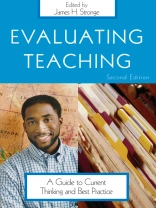Foster the development of highly qualified teachers and improve your school′s teaching and learning with solid teacher evaluations!
The connection between teacher evaluation fostering school improvement and the development of highly qualified teachers is receiving more attention than ever before. Just as there is a rational connection between school improvement and teacher performance, there is a necessary and rational connection between supporting and cultivating highly qualified teachers through effective evaluations and improving relationships in the school.
In this updated edition, top-selling author James H. Stronge and his colleagues synthesize current teacher evaluation research and blend it with practice, highlighting how to:
- Design a sound teacher evaluation system
- Assess teacher performance thoroughly and accurately
- Implement a successful teacher evaluation system
- Incorporate student performance data, teaching portfolios, and classroom observation into the evaluation process
By aligning teaching performance and improvement goals with your school′s mission, this text demonstrates how you can effectively encourage teachers to achieve a high standard of instruction at all levels.
İçerik tablosu
Preface
Acknowledgments
About the Authors
1. Teacher Evaluation and School Improvement: Improving the Educational Landscape – James H. Stronge
Part I: Designing a Teacher Evaluation System
2. Building the Foundation: Teacher Roles and Responsibilities – Patricia H. Wheeler and Michael Scriven
3. Applying the Personnel Evaluation Standards to Teacher Evaluation – Barbara B. Howard and James R. Sanders
4. Legal Considerations in Designing Teacher Evaluation Systems – Pamela D. Tucker and Marguerita K. De Sander
Part II: Assessing Teacher Performance
5. Classroom-Based Assessments of Teaching and Learning – Sally J. Zepeda
6. Client Surveys in Teacher Evaluation – James H. Stronge and Laura Pool Ostrander
7. Student Achievement and Teacher Evaluation – Pamela D. Tucker and James H. Stronge
8. Portfolios in Teacher Evaluation – Kenneth Wolf
9. Teacher Self-Evaluation – Peter W. Airasian and Arlen Gullickson
10. Using Multiple Data Sources in Teacher Evaluation Systems – Kenneth D. Peterson
Part III: Implementing the Teacher Evaluation System
11. Conducting a Successful Evaluation Conference – Virginia M. Helm and Henry St. Maurice
12. Dealing Positively With the Nonproductive Teacher: A Legal and Ethical Perspective on Accountability – Mary Jo Mc Grath
13. Teacher Evaluation and Professional Development – Stephen P. Gordon
Author Index
Subject Index
Yazar hakkında
James H. Stronge is the Heritage Professor in the Educational Policy, Planning, and Leadership Area at the College of William and Mary, Williamsburg, Virginia. His research interests include policy and practice related to teacher quality, and teacher and administrator evaluation. He has worked with numerous school districts and other educational organizations to design and implement evaluation systems for teachers, administrators, and support personnel. His work on effective teachers focuses on how to identify effective teachers and how to enhance teacher effectiveness. Dr. Stronge has presented his research at conferences such as American Educational Research Association and Association for Supervision and Curriculum Development, conducted workshops for national and state organizations, and worked with local school districts.
He has been a teacher, counselor, and district-level administrator. His doctorate is in the area of educational administration and planning from the University of Alabama.












